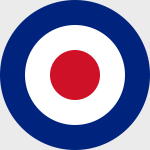Corgi AA29101 RAF Supermarine Spitfire Mk. IX Fighter - Wing Commander James Edgar "Johnnie" Johnson, No.127 (RCAF) Wing, RAF Tangmere, England, 1944 (1:72 Scale)
"Never in the field of human conflict was so much owed by so many to so few."
- British Prime Minister Winston Churchill, commenting on the British airmen in the Battle of Britain
 The Spitfire is the most famous British aircraft of all time. Although less numerous than the Hawker Hurricane, it is remembered as the sleek, thoroughbred fighting machine that turned the tide during the Battle of Britain. The Spitfire was among the fastest and most maneuverable prop-driven fighters of World War II, serving in virtually every combat theater.
The Spitfire is the most famous British aircraft of all time. Although less numerous than the Hawker Hurricane, it is remembered as the sleek, thoroughbred fighting machine that turned the tide during the Battle of Britain. The Spitfire was among the fastest and most maneuverable prop-driven fighters of World War II, serving in virtually every combat theater.
Supermarine designer Reginald Mitchell created this small, graceful, elliptical-wing fighter with eight guns in the wings that were able to fire without being hindered by the propeller. The immortal Spitfire thus became not merely one of the best-performing fighters of all time, but also one of the best-looking. Although never employed as a long-range escort, the Spitfire was a champion in an air-to-air duel. Spitfires routinely dived at the speed of sound, faster than any of the German jets.
A carrier-based version, called the Seafire, was a winner in its own right, serving valiantly on convoy routes during World War II. The Seafire 47 was even used in the early stages of the Korean War, before it was replaced by more modern jet aircraft.
Pictured here is a 1:72 scale replica of a RAF Supermarine Spitfire Mk. IX fighter that was piloted by Wing Commander James Edgar "Johnnie" Johnson Johnson, leader of No.127 (RCAF) Wing, then deployed to RAF Tangmere, England, during 1944. Sold Out!
Dimensions:
Wingspan: 6-inches
Length: 4-1/2-inches
Release Date: February 2023
Historical Account: "Beer Runs" - Wearing full D-Day identification markings, Spitfire MK329 JE-J 'Junior' was the personal mount of RAF ace pilot James Edgar 'Johnnie' Johnson, one of the RAF's top scoring fighter aces of WWII and one who's impressive tally of 34 confirmed aerial victories was scored exclusively against Luftwaffe single engined fighters. Flying extensively in support of the D-Day landings, Johnson and the squadrons under his command would be employed in aggressively clearing the skies of northern France of Luftwaffe fighter opposition, something they proved rather effective at doing. In fact, by D-Day, Johnson was one of the most successful Allied air aces still flying operationally, with his victories showing no sign of abating. Johnson and his No.127 (RCAF) Wing were one of the first fighter units to be sent to operate from forward landing bases in France following the successful Normandy landings, which is where the unusual story of this particular aircraft comes from. It appears that Spitfire Mk.IX MK329 was something of a hybrid machine and not the one Johnson actually flew in combat, but more of a hack air frame.
It is reputed that once his unit had been sent to operate in France, he used this Spitfire to fly back to the UK on unofficial 'Beer Runs', returning to their temporary home with two beer kegs attached under the wing of his aircraft. This practice was frowned upon by the RAF top brass, so units came up with ingenious ways around the restrictions, using standard external fuel tanks which had been thoroughly washed out for the purpose of transporting their beer, however, despite their very best endeavors, the beer still had a nasty aftertaste of fuel. It is thought that as Johnson was particularly highly regarded by both his men and his superiors, a blind eye may have been turned on his unofficial Spitfire sorties and the refreshing ordnance they ferried. There are few details regarding the actual production and service career of Spitfire MK329 in existence, which Johnson described in his memoirs as being a collection of components from various different Spitfires, something of a mix and match air frame. This is borne out by the fact that its serial MK329 is very similar to that of his usual and favored combat mount around that time, Spitfire MK392 - is this the reason why he referred to this aircraft as 'Junior'? Whatever the true story, this beautiful Spitfire and its unusual under slung load makes for a fitting first release for our new Spitfire Mk.IX tooling.


